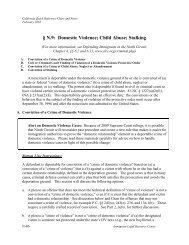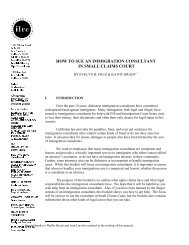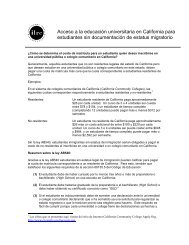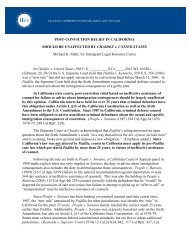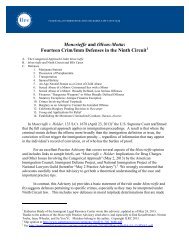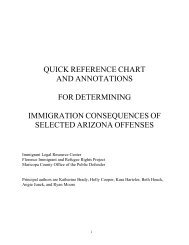Inspiring Leadership in Immigrant Communities - ILRC
Inspiring Leadership in Immigrant Communities - ILRC
Inspiring Leadership in Immigrant Communities - ILRC
- No tags were found...
You also want an ePaper? Increase the reach of your titles
YUMPU automatically turns print PDFs into web optimized ePapers that Google loves.
<strong>Inspir<strong>in</strong>g</strong> <strong>Leadership</strong> <strong>in</strong> <strong>Immigrant</strong> <strong>Communities</strong>January 2003Allow them to give short examples. If they don’t th<strong>in</strong>k they have any to contribute, then suggestsome such as:Every time we ask someone to do someth<strong>in</strong>g, we’re negotiat<strong>in</strong>g. Everyone (leaders, tra<strong>in</strong>ers,community members) has experience negotiat<strong>in</strong>g somewhere <strong>in</strong> his or her life, whether it istry<strong>in</strong>g to get child to clean up room, or try<strong>in</strong>g to conv<strong>in</strong>ce the boss to give you a day off, orreturn<strong>in</strong>g a sweater received as a gift.a. Formal vs. <strong>in</strong>formal negotiationIntroduce this topic by say<strong>in</strong>g, “Many of our experiences <strong>in</strong> negotiation are <strong>in</strong>formal(with family, friends, etc.). Although negotiation with INS and other <strong>in</strong>stitutions isdifferent, they require many of the same skills of persuasion.Discuss some of the differences. You may also ask the participants the follow<strong>in</strong>gquestions to elicit this <strong>in</strong>formation:WHAT ARE SOME OF THE DIFFERENCES BETWEEN INFORMAL ANDFORMAL NEGOTIATIONS? FOR INSTANCE, HOW IS NEGOTIATION WITH AGOVERNMENTAL INSTITUTION LIKE YOUR CHILD’S SCHOOL OR THE INSDIFFERENT FROM NEGOTIATING WITH YOUR FAMILY?Some possible answers: INS and your child’s school are more formal and have morepower, INS is “meaner,” may need to make legal arguments to them sometimes.b. Negotiation vs. legal argumentationIntroduce this section by say<strong>in</strong>g, “Sometimes, not always, us<strong>in</strong>g ‘legal authority’ can bean important tool <strong>in</strong> negotiat<strong>in</strong>g with governmental agencies such as the INS. It is good touse the facts or the story of what happened and, when necessary for you to get anadvantage, it may be useful to f<strong>in</strong>d out what the law says and use what the law says too.Sometimes you must be prepared with legal arguments or br<strong>in</strong>g a lawyer who is preparedwith legal arguments as to why your position is the right one.”2. Types of power that clients and organizations might haveLead a very quick bra<strong>in</strong>storm on tactics of persuad<strong>in</strong>g an <strong>in</strong>stitution to agree with your position.Tra<strong>in</strong>er should write ideas on board. Sample questions follow:WHAT TYPES OF POWER DO YOU AS LEADERS HAVE?WHAT TYPES OF POWER DOES YOUR COMMUNITY HAVE?WHAT TYPES OF POWER DO COMMUNITY-BASED ORGANIZATIONS HAVE?7-2



